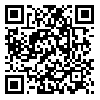Tue, Feb 3, 2026
[Archive]
Volume 9, Issue 1 (1-2019)
Iran J Ped Hematol Oncol 2019, 9(1): 40-47 |
Back to browse issues page
Download citation:
BibTeX | RIS | EndNote | Medlars | ProCite | Reference Manager | RefWorks
Send citation to:



BibTeX | RIS | EndNote | Medlars | ProCite | Reference Manager | RefWorks
Send citation to:
Homeirani F, Keramati M R, Sadeghian M H, Mozafari Z, Moradi Zarmehri A. Red Blood Cells Alloimmunization and Autoimmunization in Multi-transfused Thalassemia Patients in South of Iran. Iran J Ped Hematol Oncol 2019; 9 (1) :40-47
URL: http://ijpho.ssu.ac.ir/article-1-314-en.html
URL: http://ijpho.ssu.ac.ir/article-1-314-en.html
Farogh Homeirani 
 , Mohammad Reza Keramati *
, Mohammad Reza Keramati * 
 , Mohammad Hadi Sadeghian
, Mohammad Hadi Sadeghian 
 , Zeynab Mozafari
, Zeynab Mozafari 
 , Azam Moradi Zarmehri
, Azam Moradi Zarmehri 


 , Mohammad Reza Keramati *
, Mohammad Reza Keramati * 
 , Mohammad Hadi Sadeghian
, Mohammad Hadi Sadeghian 
 , Zeynab Mozafari
, Zeynab Mozafari 
 , Azam Moradi Zarmehri
, Azam Moradi Zarmehri 

Cancer molecular pathology research center, Emam Reza hospital
Abstract: (3946 Views)
Background: Recurrent blood transfusion is a common treatment in patients with thalassemia. The development of antibodies against red blood cell (RBC) antigens complicates RBC cross-matching, enhances the in vivo destruction of transfused cells, accelerates tissue iron overloading, delays the provision of safe transfusion, and reduces health-related quality of life.
Materials and Methods: In total, 516 thalassemia patients with a mean age of 18.5 years were included in this cross-sectional study in Mashhad University of Medical Sciences, Razavi Khorasan Province, Iran, in cooperation with the Abu Rayhan Special Medical Center and Hormozgan Blood Transfusion Organization between June 2015 and May 2016. The detection and identification of alloantibodies were done using 3 screen cells and 11 panel cells, respectively. To detect autoantibodies, auto-control was performed using polyspecific Coombs (IgG + C3d) standard method.
Results: Alloantibodies and autoantibodies were observed in 16 (3.1%) and 21 (4.1%) patients, respectively. Among patients with alloantibodies, 2 patients (12.5%) developed 3 antibodies (Anti-c,E,P1; Anti-c,E,K), 1 patient (6.25%) developed 2 antibodies (Anti-D,C), and 13 patients developed 1 antibody (4 patients Anti-D (25%); 3 Anti-K (18.75%); 2 Anti-E (12.5%); 2 Anti-C (12.5%); 1 Anti-Jka (6.25%); and 1 Anti-Jkb (6.25%)). A statistically significant correlation between patient age (P = 0.031), age of splenectomy (P = 0.006), Rh(D) (P = 0.001), leukoreduction of RBCs (P = 0.043), and type of disease (P = 0.006) with RBC alloimmunization was seen.
Conclusions: This study emphasized the need for the determination of RBC minor antigens, especially for Rh, Kell, and Kidd blood group systems, before the first transfusion and transfusion of antigen-matched blood. In addition, transfusion of prestorage leukoreduced packed cells is recommended for these patients.
Materials and Methods: In total, 516 thalassemia patients with a mean age of 18.5 years were included in this cross-sectional study in Mashhad University of Medical Sciences, Razavi Khorasan Province, Iran, in cooperation with the Abu Rayhan Special Medical Center and Hormozgan Blood Transfusion Organization between June 2015 and May 2016. The detection and identification of alloantibodies were done using 3 screen cells and 11 panel cells, respectively. To detect autoantibodies, auto-control was performed using polyspecific Coombs (IgG + C3d) standard method.
Results: Alloantibodies and autoantibodies were observed in 16 (3.1%) and 21 (4.1%) patients, respectively. Among patients with alloantibodies, 2 patients (12.5%) developed 3 antibodies (Anti-c,E,P1; Anti-c,E,K), 1 patient (6.25%) developed 2 antibodies (Anti-D,C), and 13 patients developed 1 antibody (4 patients Anti-D (25%); 3 Anti-K (18.75%); 2 Anti-E (12.5%); 2 Anti-C (12.5%); 1 Anti-Jka (6.25%); and 1 Anti-Jkb (6.25%)). A statistically significant correlation between patient age (P = 0.031), age of splenectomy (P = 0.006), Rh(D) (P = 0.001), leukoreduction of RBCs (P = 0.043), and type of disease (P = 0.006) with RBC alloimmunization was seen.
Conclusions: This study emphasized the need for the determination of RBC minor antigens, especially for Rh, Kell, and Kidd blood group systems, before the first transfusion and transfusion of antigen-matched blood. In addition, transfusion of prestorage leukoreduced packed cells is recommended for these patients.
Type of Study: Research |
Subject:
Heart
Received: 2017/07/5 | Accepted: 2018/11/27 | Published: 2019/01/6
Received: 2017/07/5 | Accepted: 2018/11/27 | Published: 2019/01/6
Send email to the article author
| Rights and permissions | |
 |
This work is licensed under a Creative Commons Attribution-NonCommercial 4.0 International License. |


